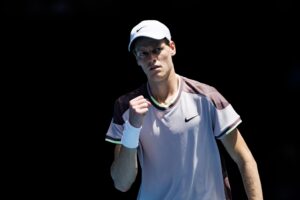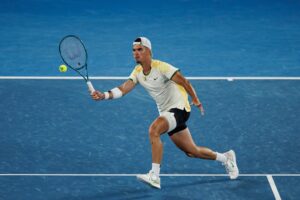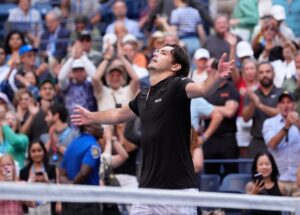There is much to love about the ATP Finals. The O2, London’s most famous and successful O-shaped building since Shakespeare’s Globe, is an atmospheric home for it, with many tennis players, writers and fans even calling for it to become the permanent home of the end-of-season finals; the tournament gives British tennis fans who are unable to get Wimbledon tickets another opportunity to see the world’s best players; and its staging in London also reflects the recent shift in global tennis power (at least in the men’s game) from America to Europe. However, there is one thing that still upsets some people, and that is the continued presence at the tournament of doubles.
Anyone watching the tournament on TV might not know that the ATP Finals brings together not only the best eight male singles players (give or take half a dozen injury absentees), but also the best eight male doubles pairings from the previous year. There is little, if any, television coverage of the doubles, with the host broadcaster, the BBC, for example, not showing any doubles play at all, even online. Of course, that lack of coverage only confirms some people’s view that doubles is now an afterthought that has little or nothing to do with the serious business of singles play.
Some tennis fans even claim that they are uninterested in doubles and wouldn’t watch it on TV if it was being broadcast. Essentially, their argument is that because none of the top singles players now play doubles regularly, doubles play is inherently second-rate, and some non-doubles fans go so far as to claim that any of the top fifty men’s singles players would probably excel in doubles if they switched to the two-man game.
As a great lover of doubles tennis, I have to disagree and point out that such a view, however widely held, betrays a lack of understanding of the nature of doubles play. I agree that the very best singles players, and particularly “the big four” of Federer, Nadal, Djokovic, and Murray, would excel at doubles; indeed, occasionally they have already done so, either in the Olympics or the Davis Cup. However, I certainly do not think that it is a foregone conclusion that the rest of the top 50 best men’s players would easily make the transition to doubles.
Most importantly, even an average doubles player has to be good at volleying, which is almost a lost art in singles play, as Roger Federer claimed when he won Wimbledon again this year. With the vast majority of singles players now opting for a baseline-only game, such that they virtually never go near the net, many of them are unable to execute anything but the simplest volleys, and certainly not the incredible half-volleys and rat-a-tat bursts of “volleying rallies” that are the basis of the best doubles games, as demonstrated at The O2 in particular by the wonderful clash between Jamie Murray/Bruno Soares and the legendary Bryan brothers on Day Two.
In the past, most singles players – even the best singles players – played doubles, too, with many of them regarding doubles play as both more enjoyable than training and the perfect way to practice their volleying. Bjorn Borg was the first major singles player of either gender who completely abandoned doubles, so that he could concentrate on his singles play, and he has been followed by most of the top players ever since, with the exception of his old rival, John McEnroe. McEnroe was such an accomplished doubles player that in both 1983 and 1984, when he was undoubtedly at his absolute peak as a player, he won both the Wimbledon men’s singles title and the men’s doubles title with Peter Fleming.
Now, of course, the only residual trace of the traditional importance of doubles is to be found in the Davis Cup. Thankfully, the International Tennis Federation has resisted, at least for the time being, any attempt to downgrade doubles even further, for example by reducing doubles matches in the Davis Cup to three sets rather than five, or by eliminating doubles play altogether. And the Davis Cup final later this month could actually hinge on the doubles contest, as France and Belgium look fairly evenly matched in the singles but there is a yawning gap between the countries’ doubles pairings. France’s Pierre-Hugues Herbert and Nicolas Mahut are among the top eight teams in the world, as demonstrated by their appearance this week at The ATP Finals, whereas Belgium’s Rubens Bemelmans and Arthur de Greef are nowhere near that level, as evidenced by their fairly disastrous Davis Cup semi-final defeat to Australia’s John Peers and Jordan Thompson, when they not only lost on their favoured surface of clay but were actually bagelled in the third set.
There is almost certainly no way of permanently arresting the decline of doubles, especially as the demands of singles play (particularly on the men’s side of the game) grow ever greater. Nevertheless, there are certain things that could at least be tried, such as having dedicated doubles tournaments a couple of times a year and, even more importantly, dedicated doubles finals days at the Majors, with the Wimbledon doubles finals, for example, being played on a full Number One Court rather than on a Centre Court that is four-fifths empty. And one other easy way to restore at least some of the status of doubles is for tennis fans to stop assuming that doubles is a simple game that can easily be conquered by the best singles players.
LastWordOnTennis would like to thank O2 Sports, the sponsor of the O2 arena, for giving us the tremendous opportunity to attend several sessions of the ATP Finals.
Main Photo:
Embed from Getty Images






